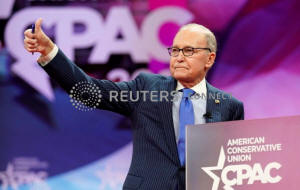|
White House's Kudlow says U.S.-China
talks making progress, could extend
 Send a link to a friend
Send a link to a friend
 [April 04, 2019]
By Jeff Mason [April 04, 2019]
By Jeff Mason
WASHINGTON (Reuters) - Trade talks between
the United States and China made "good headway" last week in Beijing and
the two sides aim to bridge differences during talks that could extend
beyond three days this week, White House economic adviser Larry Kudlow
said.
Kudlow, speaking to reporters on Wednesday at an event organized by the
Christian Science Monitor, said China had recognized problems for the
first time during the talks that the United States has raised for years.
Negotiations continued in Washington on Wednesday after meetings last
week in Beijing, spearheaded by U.S. Trade Representative Robert
Lighthizer and Treasury Secretary Steven Mnuchin.
President Donald Trump will meet Vice Premier Liu He, who is leading the
Chinese side in the talks, in the Oval Office at 4:30 p.m. (2030 GMT) on
Thursday, the White House said.

A date for a meeting between Trump and Chinese President Xi Jinping
could be announced as early as Thursday, Bloomberg and the Wall Street
Journal reported, citing unidentified sources, which would signal that a
deal could be close. But the WSJ, citing an administration official,
said discussions remained fluid and those plans could change.
Asked about the potential for a meeting between the presidents, China's
Foreign Ministry told a news briefing on Thursday that it had noted that
Trump had repeatedly expressed his hope to meet with Xi.
"President Xi also looks forward to maintaining communication with
President Trump in all kinds of ways," ministry spokesman Geng Shuang
said without elaborating.
The United States and China have levied tariffs on hundreds of billions
of dollars' worth of two-way trade since July 2018. Trump has said he
wants a "great deal" with China and has hinted that tariffs could remain
in place for some time.
Chinese commitments to increase purchases of American agricultural,
energy and manufactured products are expected to be part of a final
deal, and a person familiar with the talks said China would get about
six years to meet those commitments, or until 2025.
[to top of second column]
|

White House economic adviser Larry Kudlow gives a thumbs up after
speaking at the Conservative Political Action Conference (CPAC) at
National Harbor in Oxon Hill, Maryland, U.S., February 28, 2019.
REUTERS/Kevin Lamarque/File Photo

The deadline was reported earlier by Bloomberg, but Trump
administration officials previously said that a six-year timeline
for purchases exceeding $1 trillion had been under discussion.
A final number for the amount of purchases has not been settled, the
person said.
Kudlow said Liu and his team would remain in Washington for three
days and possibly longer.
"We're covering issues that have never really been covered before,
including enforcement," Kudlow said, listing U.S. accusations that
Beijing engages in intellectual property theft, forced transfer of
technology from U.S. companies doing business in China, cyber
hacking, tariffs and non-tariff barriers for commodity trading.
"All making good progress, all making good headway, but we're not
there yet," he said about those areas. "We hope this week to get
closer."
Kudlow said it was significant that China had "acknowledged these
problems for the first time. They were in denial."
Those structural issues along with the way a potential deal would be
enforced have been sticking points during months of talks between
the world's two largest economies.
Kudlow said on Wednesday that U.S. charges against Chinese
telecommunications giant Huawei Technologies Co Ltd had generally
not come up during trade talks.

Kudlow also said no decisions had been made on tariffs on auto
imports coming from top U.S. allies.
(Reporting by Jeff Mason; Additional reporting by Michael Martina in
Beijing; Editing by Grant McCool and Peter Cooney & Simon
Cameron-Moore)
[© 2019 Thomson Reuters. All rights
reserved.]
Copyright 2019 Reuters. All rights reserved. This material may not be published,
broadcast, rewritten or redistributed.
Thompson Reuters is solely responsible for this content. |